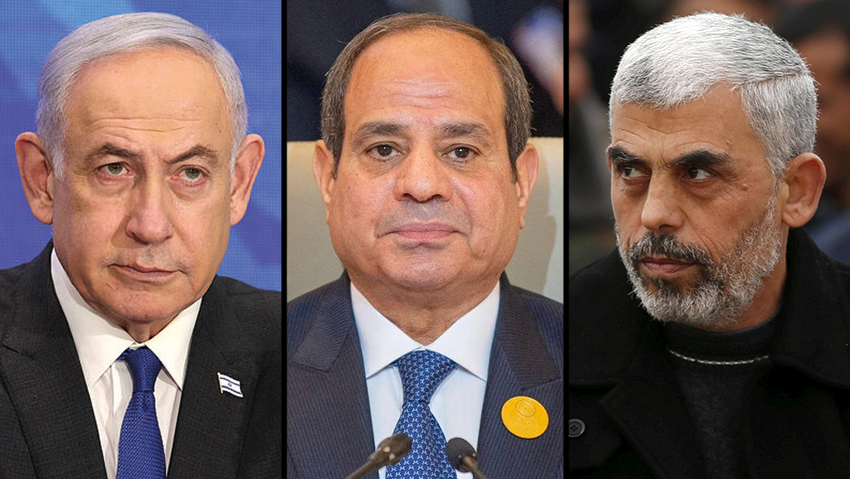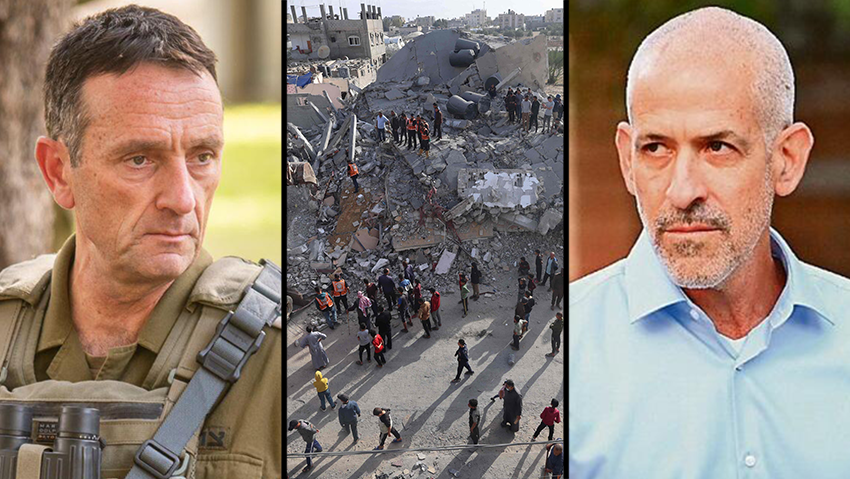The Security Cabinet held Thursday a meeting to address the deadlock in negotiations with Hamas, after the terror organization essentially rejected the latest American compromise proposal and agreed to release fewer than 20 hostages during a six-week cease-fire. Following the meeting, the smaller War Cabinet convened later on Thursday night to deliberate on additional pathways for a potential deal.
The Security Cabinet discussion also touched upon the necessity of a "strong military arm" to exert pressure on Hamas, aligning with the planned operation in Rafah. Such an operation raises significant concerns in Egypt, which is currently working diligently to prevent a military escalation in the border city while simultaneously reviving negotiations for a deal.
2 View gallery


Benjamin Netanyahu, Abdel Fattah El-Sisi, Yahya Sinwar
(Photo: Alex Kolomoisky, Reuters)
A senior Israeli official told Ynet that "there is no contradiction between operations in Rafah and negotiating a hostage release. As we approach Rafah, Egyptian involvement naturally increases, but they have always been a dominant factor with whom we maintain weekly contact. They directly connect to Gaza and are critical to the Gaza Strip's future." He clarified that "We are heading to Rafah without a doubt, but we will exhaust every chance to bring hostages home."
The senior official added: "There is hope that the Egyptian route will evolve positively. We need to try every possible way. Egypt has been part of the mediation efforts for a long time. Now they are highly motivated because they want a deal, so we must maintain optimism, especially as the Rafah lever is being raised and approaches."
Shin Bet chief Ronen Bar and IDF Chief of Staff Herzi Halevi visited Cairo on Wednesday and met with Egyptian intelligence chief General Abbas Kamel, who presented a new Egyptian proposal to reach a hostage deal and end the war, consisting of three interconnected clauses.
Under the first clause of the Egyptian plan, Israel will commit to halting all preparations for the Rafah operation. The Egyptian intelligence chief clarified that not only Egypt but also the United States and the European Union fear for the fate of the civilian population in the event of an Israeli incursion into southern Gaza.
The second clause is the release of all Israeli hostages in two stages, over a 10-week period. It is important to note that Egypt did not specify the number of Israeli hostages (apparently their number is unknown to Egypt) but clarified that this is the release of "all hostages" in exchange for the release of hundreds of Palestinian prisoners and terrorists.
The third clause is a full cease-fire for a year, during which Israel and Hamas commit not to fire or use weapons on land and in the air. The declaration of the cease-fire will mark the beginning of steps toward the establishment of a Palestinian state. The "patrons" of this declaration will be the United States, Egypt, Jordan and the Palestinian Authority.
From Cairo, it was reported to Ynet and Yedioth Ahronoth that Bar and Halevi did not respond to the Egyptian plan but committed to presenting it for discussion with Prime Minister Benjamin Netanyahu and the Security Cabinet.
Meanwhile, an Egyptian delegation is set to arrive in Israel on Friday to discuss the renewal of the indirect negotiation process with Hamas and the release of hostages in exchange for Palestinian prisoners. According to the new proposal, Hamas demands the release of 50 prisoners for each kidnapped soldier and 30 prisoners for each kidnapped civilian. A meeting with senior members of the National Security Council has been scheduled for the delegation.
Egyptian President Abdel-Fattah el-Sisi announced that Egypt opposes the transfer or removal of Palestinians from Gaza to the Sinai or any other place. "There will be no migration of Gaza residents," el-Sissi declared in a speech Wednesday, on the 42nd anniversary of Israel's withdrawal from Sinai. "Our goal is to protect Egypt's security, achieve a cease-fire in Gaza, and deliver humanitarian aid to Gaza residents," he added.
Sisi, who received a briefing from the Egyptian intelligence chief about the conversation with Bar and Kochavi, warned against Israeli action in Rafah and dismissed rumors of "understandings" between Egypt and Israel regarding such action. "Any action in Rafah will bring great disaster to the population of the Strip, as well as to regional peace and security," emphasized the Egyptian president.


